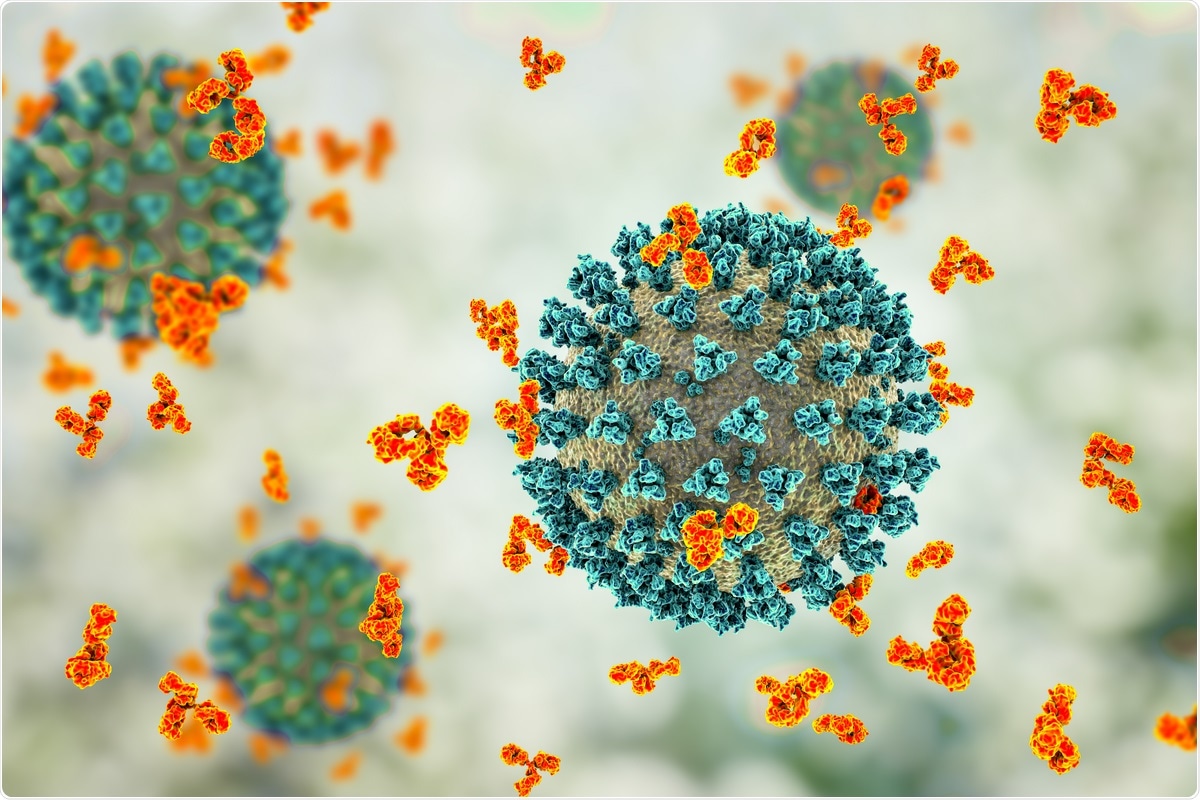Severe acute respiratory syndrome coronavirus 2 (SARS-CoV-2) was first reported in Wuhan, China, in 2019. It is the causal agent of the coronavirus disease 2019 (COVID-19) pandemic. In addition to SARS-CoV-2, six other coronaviruses are known, among which four are seasonal human coronaviruses and cause mild self-limiting upper respiratory tract infections.
 Study: Humoral response to SARS-CoV-2 and seasonal coronaviruses in COVID-19 patients. Image Credit: Kateryna Kon/ Shutterstock
Study: Humoral response to SARS-CoV-2 and seasonal coronaviruses in COVID-19 patients. Image Credit: Kateryna Kon/ Shutterstock
In a new study published in the Journal of Medical Virology, scientists conducted a cohort study and measured the prevalence and the levels of antibody responses to the nucleocapsid (N) protein of SARS-CoV-2 and four seasonal human coronaviruses.
Background
The protective effect of previous human coronavirus infections against SARS-CoV-2 infection and less severe COVID-19 disease have been described by scientists. Description of the former has mainly been based on presumed infections, while for the latter case, PCR-proven infections have been associated with less severe disease manifestations. However, more research is needed to determine the effect of previous infections on disease severity. In the current study, scientists used ELISA-based immunoassays to detect antibodies against five human coronaviruses. They also tested sera from SARS-CoV-2 convalescent plasma donors and a control group (SARS-CoV-2 unexposed).
A new study
The current study was approved by the local ethics committee at Heinrich-Heine University Duesseldorf, and informed consent was obtained from 115 SARS-CoV-2 convalescent plasma donors. The control group (N=114) excluded patients with known underlying chronic diseases or immunosuppression. The basic demographics were similar for both groups.
The severity of disease was classified as 0 for patients without any symptoms (n=5), 1 in patients with only mild symptoms and no restriction on activities (n=28), 2 for patients with restriction of activities (n=44), and 3 for patients with more severe symptoms (n=16). Classification information was not available for 20 patients, none of whom were hospitalized.
All blood samples were collected between March 2020 and July 2020, and for ten patients, it was possible to collect sera for up to six months after the onset of symptoms. Researchers used a two-step capture ELISA protocol for the analysis, where the antigens used were affinity-purified SARS-CoV-2, HCoV-HKU1, HCoV-OC43 HCoV-229E, and HCoV-NL63-Nucleocapsid (N), expressed as GST fusion proteins in E. coli BL21 cells in situ on glutathione casein-coated ELISA plates.
Main findings
Scientists found a correlation between the level of antibodies to SARS-CoV-2 and the severity of the disease. However, they found no correlation between the severity and the level of antibodies to seasonal coronaviruses. The reason for the latter finding could be that in some viral infections, non-neutralizing antibodies may enhance infection and not protect against reinfection. Based on the available data, researchers concluded that there was not enough evidence to prove that previous infections with seasonal coronaviruses had an impact on the severity of COVID-19 disease.
In the ten donors with consecutive sera, researchers observed that in most cases, antibody levels against seasonal coronaviruses were high in the initial serum and decreased in the subsequent follow-ups, which could be owing to a cross stimulation of B cells. As this was observed in many cases with antibodies against more than one coronavirus, it is unlikely to be caused by pure cross-reactivity of antibodies.
The waning of antibodies has been documented in previous studies, but in the current study, scientists showed that this decline also affected antibodies against seasonal coronaviruses. However, scientists stated that they possess no information on whether this cross-stimulation of antibodies also occurs against epitopes of other viral proteins.
The most significant finding of the study was the highly significant correlation of antibody levels among all coronaviruses. The correlation with SARS-CoV-2 was slightly lower, possibly because COVID-19 patients were still in the post-infectious period when factors, such as the time of blood collection and the severity of the disease, could influence antibody levels.
Consistent with previous studies, researchers observed that in the post-COVID sera, individual differences in the level of antibodies were large. It was not clear whether the decline in antibodies also translated to lost protection against reinfection with SARS-CoV-2. Based on the findings of this paper, scientists argued that there could be an individually adapted humoral immune response against the entire family of human coronaviruses. This observation could inform the assessment of SARS-CoV-2 vaccine-induced protection by the humoral immune system.
Conclusion
An alternative interpretation of the data could hint towards “trained immunity.” Some evidence suggests that the influenza vaccine could result in protection against COVID-19 by inducing trained immunity. It could therefore be sensible to determine pre-existing immunity against seasonal coronaviruses before vaccinating individuals against SARS-CoV-2. This will help researchers and policymakers understand whether the low responsiveness to the vaccine is simply because the individual is a coronavirus low-responder.
- Adams, O. et al. (2021) "Humoral response to SARS‐CoV‐2 and seasonal coronaviruses in COVID‐19 patients", Journal of Medical Virology. doi: 10.1002/jmv.27427. https://onlinelibrary.wiley.com/doi/abs/10.1002/jmv.27427
Posted in: Medical Science News | Medical Research News | Disease/Infection News
Tags: Antibodies, Antibody, Blood, Chronic, Convalescent Plasma, Coronavirus, Coronavirus Disease COVID-19, E. coli, Immune Response, Immune System, immunity, Immunoassays, Immunosuppression, Influenza, Pandemic, Protein, Research, Respiratory, Respiratory Tract Infections, SARS, SARS-CoV-2, Severe Acute Respiratory, Severe Acute Respiratory Syndrome, Syndrome, Vaccine, Virology

Written by
Dr. Priyom Bose
Priyom holds a Ph.D. in Plant Biology and Biotechnology from the University of Madras, India. She is an active researcher and an experienced science writer. Priyom has also co-authored several original research articles that have been published in reputed peer-reviewed journals. She is also an avid reader and an amateur photographer.
Source: Read Full Article
